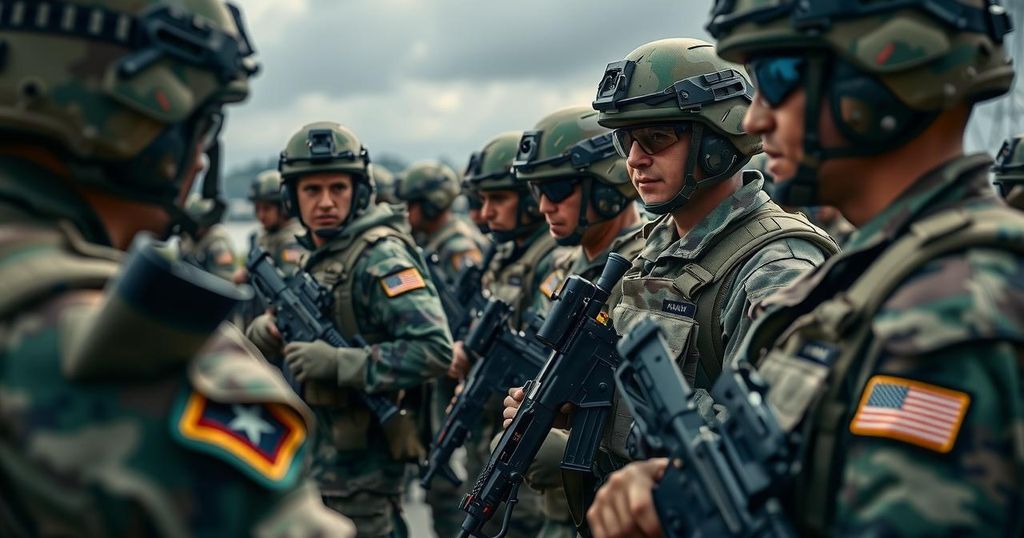World news
ASIA, BIDEN ADMINISTRATION, CHINA, DEFENCE, DEFENSE MINISTRY, ENERGY INFRASTRUCTURE, EUROPE, EUROPE/ASIA, GEOPOLITICS, INDO - PACIFIC, KIM, KIM JONG UN, KURSK, KYIV, MEXICO, MILITARY, NORTH AMERICA, NORTH KOREA, RUSSIA, SETH GODIN, SOUTH KOREA, UKRAINE, US, VLADIMIR PUTIN, VOA, WAR, WORDPRESS
Michael Grant
0 Comments
Potential North Korean Military Support for Russia in Ukraine Conflict
North Korea may deploy up to 100,000 troops to Russia for the Ukraine conflict, according to sources discussing the evolving partnership between Kim Jong Un and Vladimir Putin. Initial troop deployments could involve around 15,000 soldiers rotating between units. The collaboration raises concerns about the international implications of the conflict, particularly in the Indo-Pacific region, prompting discussions among world leaders regarding strategies to mitigate escalation.
Recent analyses suggest that North Korea may consider providing military support to Russia in the form of 100,000 troops for its ongoing conflict in Ukraine. Although discussions between North Korean leader Kim Jong Un and Russian President Vladimir Putin indicate potential troop deployments, it remains uncertain when such actions would take place. Instead, any military assistance likely would occur in smaller groups that rotate periodically rather than through a single large deployment. Ukrainian officials currently anticipate the arrival of up to 15,000 North Korean troops, expected to be stationed in Russia’s Kursk region and possibly in eastern Ukraine occupied by Russian forces. The incremental engagement of North Korean forces has raised concerns among Ukraine’s allies, fearing this collaboration may intensify the already significant conflict across Europe. Moreover, the growing alliance between Kim and Putin could alter the security dynamics within the Indo-Pacific, amid increasing tensions between the United States and China. The urgency of this issue has prompted discussions among international leaders. German Chancellor Olaf Scholz plans to convey to Chinese President Xi Jinping the necessity of leveraging China’s influence to mitigate the escalation of warfare between Russia and Ukraine. Concerns were also vocalized during recent gatherings such as the APEC meeting in Lima, Peru. Observers note that Xi has historically supported both Putin and Kim in resisting Western hegemony; however, his silence on North Korea’s troop movements may signal discontent with this military collaboration. Since the beginning of the conflict, North Korea has reportedly dispatched over 10,000 troops alongside Russian forces in the Kursk area. In return, Moscow has compensated Pyongyang and provided assistance aimed at enhancing its military capabilities. Analysts assert that there is a strong likelihood of North Korea pursuing advanced military technologies from Russia, including tactical nuclear systems and ballistic missile technology. Additionally, North Korea has contributed substantial amounts of artillery and ammunition to Russian forces. Amid these developments, Ukraine has urged its allies to empower its military with advanced long-range weaponry aimed at countering Russian advancements. As the global implications of the Russo-Ukrainian war intensify, the involvement of North Korean troops signals a worrisome expansion of the conflict, with potential ramifications extending across broader geopolitical arenas.
The evolving relationship between North Korea and Russia has raised concerns regarding military collaboration amidst the ongoing war in Ukraine. North Korea’s strategic alignment with Russia under the leadership of Kim Jong Un aims to bolster support for Putin’s military endeavors against Ukraine. This partnership highlights a broader trend of cooperation among nations challenging Western influence, primarily marked by the interactions of these two leaders. Understanding their motivations and potential actions is critical in grasping the larger implications for global security and diplomatic relations, particularly in the context of the Indo-Pacific region.
In conclusion, the potential deployment of North Korean troops to support Russian military operations in Ukraine represents a significant escalation in the conflict and carries profound implications for regional stability. The collaboration between Kim Jong Un and Vladimir Putin could reshape alliances and security dynamics, especially within the Indo-Pacific. As international leaders grapple with these developments, the necessity for diplomatic engagement and strategic coordination becomes increasingly urgent to prevent further escalation and ensure regional security.
Original Source: m.economictimes.com




Post Comment